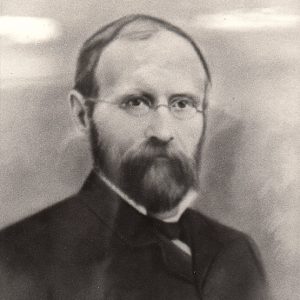calsfoundation@cals.org
Jacob Frolich (1837–1890)
Jacob Frolich was a German immigrant and a Confederate soldier who became an active and high-profile figure in post–Civil War Arkansas politics. An alleged leader of the Ku Klux Klan in Arkansas, he was accused of murder in a case that highlighted the political divisions in the state at that time. Ultimately acquitted of the charges, he went on to be elected to three terms as Arkansas’s secretary of state.
Jacob Frolich was born in Obernforf, Bavaria, Germany, on November 15, 1837, to John Frolich and Marie Elizabeth Herrman Frolich. When Frolich was nine, the family came to the United States. They lived initially in New Orleans, Louisiana, but ultimately settled in Indiana. At the age of fourteen, Frolich began apprenticing as a printer, first in Evansville, Indiana, then in St. Louis, Missouri, and finally in New Orleans. He then worked as a clerk in a number of New Orleans businesses before he returned to the printing trade in both New Orleans and other spots in Louisiana. He continued on this rather aimless path, doing printing work during the winter and then traveling during the summers, at one point venturing to Nebraska in order to see Native Americans.
With the onset of the Civil War, Frolich, who supported the Confederate cause, enlisted in the Confederate army. He served with the Army of Tennessee and Washington Artillery of New Orleans. He suffered a few slight wounds but served until the end of the war.
After the war, Frolich settled in Searcy (White County), where he established a newspaper, the White County Record, in 1866. The paper had a clear Democratic Party slant and was known for its strong criticism of the area’s “Radical Republicans.” His opposition to Republican Reconstruction efforts went beyond the pages of his newspaper, however, as Frolich was reported to be the head of the Searcy Ku Klux Klan.
Almost a year and a half after the fact, Frolich was one of a group accused of the 1868 murder of Albert Parker, an agent of the Republican governor, Powell Clayton. When a warrant was issued with no option for bail, Frolich went to Canada, where he worked as a printer for over a year until he was allowed bail. Denying all charges, he returned to Arkansas and demanded a trial. At trial, the prosecution was unable to produce any evidence to support a conviction, and Frolich was acquitted.
He resumed his printing and journalistic endeavors, which by now included serving as the secretary and manager of the Gazette Publishing Company in Little Rock (Pulaski County). He served as the first secretary of the Arkansas Press Association, founded in 1873. In 1874, he was elected assistant secretary of the Arkansas Senate, and he became chief secretary of the Senate in 1877. The following year, he was elected Arkansas’s secretary of state. Elected to three two-year terms, he held the post from 1879 to 1885. As secretary of state, Frolich paid particular attention to the care of the State House, urging the legislature to provide adequate funding for needed repairs and annual upkeep. Arguing that the building was important to the state’s efforts to attract new citizens, he arranged for the construction of a new gate and also had an unattractive barracks removed from the grounds. He also sought to update and secure state records. In addition, he investigated ways to enhance state revenue while also beginning an effort to acquire portraits of prominent Arkansans.
Frolich married Mollie Gaines Finley on September 2, 1869, and the couple had three children. Although based in Searcy, given his political involvement, the family also lived in Little Rock, owning Curran Hall, a landmark that dates to 1842. Given the political controversy of the time, Frolich was concerned for his and family’s security, especially after he was accused of Parker’s murder. As a result, he had the house altered with the installation of a number of carefully placed trapdoors. He sold the house in 1881.
After completing his terms as secretary of state, Frolich went to Washington DC, where he became chief clerk of the Mineral Division of the Department of the Interior under President Grover Cleveland. After less than a year working in the Interior Department, he was named chief financial clerk of the Patent Office, a post he held until the end of the first Cleveland presidency in 1889. When Cleveland left office, Frolich returned to Little Rock, becoming the business manager of the Arkansas Gazette. He resigned in early 1890 to go into the mercantile business with J. H. Sannoner & Co. At the same time, he announced his candidacy for the office of state treasurer. However, on April 25, 1890, Frolich died at his home following a surgical procedure. He is buried in Oakland Cemetery in Little Rock.
For additional information:
“At Death’s Door.” Arkansas Gazette, April 23, 1890, p. 1.
“Col. Frolich Is Dead” Arkansas Gazette, April, 25, 1890, p. 6.
“Funeral of the Late Col. Frolich.” Arkansas Gazette, April 27, 1890, p. 1.
Jacob Frolich Papers. Arkansas State Archives, Little Rock, Arkansas.
Kwas, Mary L. A Pictorial History of Arkansas’s Old State House: Celebrating 175 Years. Fayetteville: University of Arkansas Press, 2011.
William H. Pruden III
Ravenscroft School
 Politics and Government
Politics and Government Post-Reconstruction through the Gilded Age, 1875 through 1900
Post-Reconstruction through the Gilded Age, 1875 through 1900 Jacob Frolich
Jacob Frolich 



Comments
No comments on this entry yet.